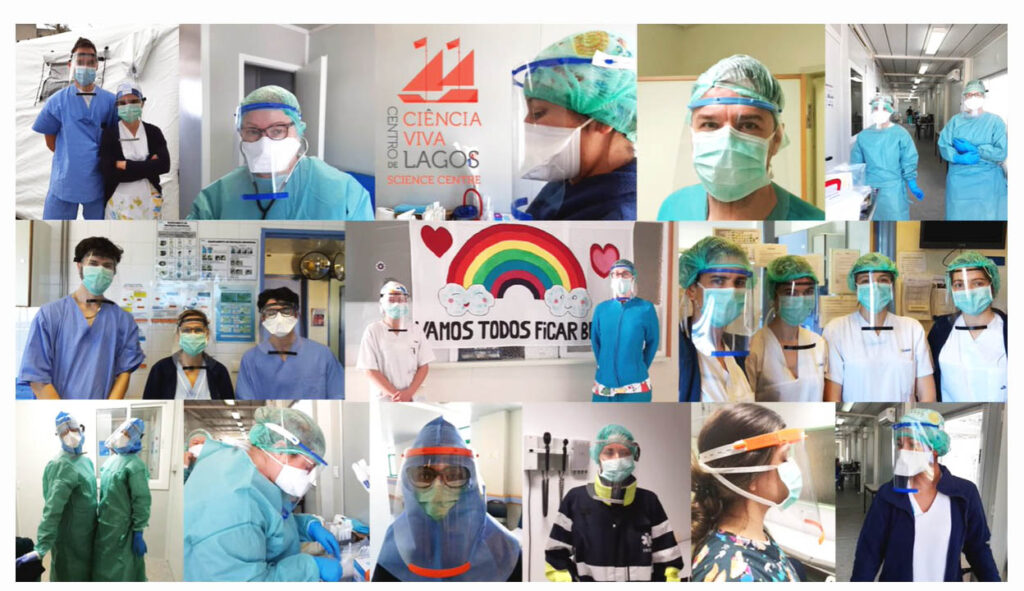The Center had been closed for days.
It was Saturday, and we were tied up at home. Outside, only a van circulated the deafening message that we should stay tied up at home. Warnings not of a bombing, not of an imminent attack, just that we should stay home, because he was in the streets, in the shops, everywhere.
Who?
The virus, which we are so fed up with talking about, discussing, fearing, in short, the virus. The one with the pandemic.
We knew nothing and feared everything.
It was Saturday, March 21st, and there was a full visor on the table and it was the most beautiful thing., but at the same time more banal, than I remember today. An object, nothing more than that. This last year has been 10 years for a man's memory.
A phone call with Ricardo Mexia was what triggered this idea. There was a group of volunteers who were printing visors, supports made on 3D printers.
He remembered our printers from when he had been at the Center for a lecture on the virus in late February. The volunteer project was the 3D Mask Portugal, led by Rúben Borges, with whom there would be a lot to talk, to let off steam, more than with someone I've never been to personally.
Pissing him off and part of my team was the next step. It was possible, my team told me. Reuben too. And we had to get rubber bands to secure the visors, at a time when they weren't even talking about masks, just visors, the barriers that doctors and nurses asked for.
Hélder, Pedro and Helena modified and optimized the model created by others.
They mixed haberdashery rubber bands and polycarbonate sheets, where have you seen this? They took the printers home, in the Center they were idle. They put the CNC of the Center to cut the visors, which were not times of rest.
They had been begging for yards of rubber bands, ladies of closed-door haberdashery in Lagos, thrilling them when they found out what the hell the rubber bands were for. And what were they for? To support the visors on the heads of those who would have preferred not to see what entered them through the wards.
They sifted through the contacts of printers in Lagos and surroundings, collecting transparent sheets, at a time when they were sold out throughout the country.
People who had printers at home volunteered, doing the distribution logistics for the remaining materials.
The two Hs and the P, from the Center, created assembly lines, in their homes, for printing supports, cutting sheets, assembling elastics, packaging the final products, and have been distributing them to health professionals, like traveling salesmen, at a time when travel disappeared from our lives.
There were meetings with nurses who had been students in the past. Visors were distributed in hypermarket parking lots to doctors and nurses, contacts still unmasked, because they were still far from being rooted in our days. They were just visors, but wanted visors.
There were many denial calls to Senior Care Homes because the Center decided to just hand over the visors to healthcare professionals. It was very difficult to live with this option and turn the desperate people off, but we feared that if we gave them to homes we would run the risk of unleashing an uncontrollable fire. Health professionals would know how to disinfect them, it was our decision.
There were companies that offered material. There were discussions with which the enormous desire to help did not let us see that we were all few.
There was, there was, there was, and fortunately after a certain point there was no need, we left everyone, those who collaborated with us and the Centre's team, the two Hs and the P, were no longer needed.
What we will never fail to do is to express our enormous gratitude to the health professionals who, by taking care of everyone during hell, helped us too.
Feeling useful and maintaining mental health.
Everything else is a lot of stories to tell your grandchildren.
It's nothing special, but it's our stories of when they needed us and we had the ability and opportunity to help.
Author Luís Azevedo Rodrigues is executive director of the Centro Ciência Viva de Lagos




















Comments